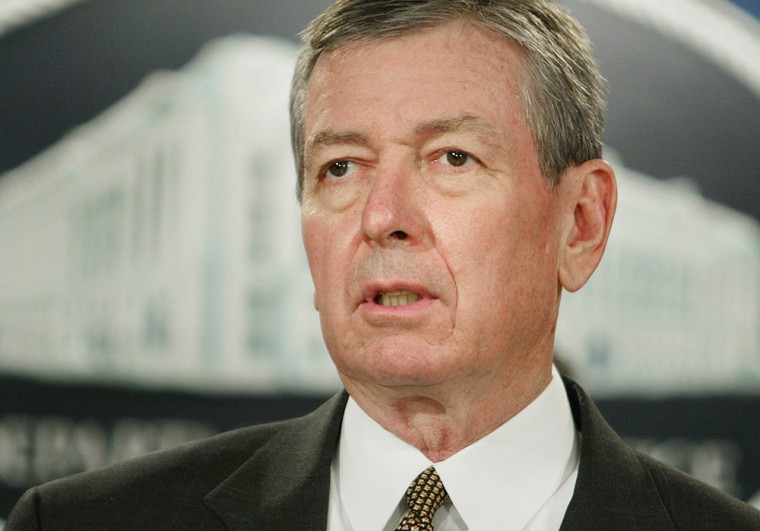A more nimble FBI and CIA working together might have uncovered the Sept. 11, 2001 terrorist plot, the commission investigating the attacks said Tuesday in two staff reports, laying out an agonizing series of missed opportunities, half measures and bureaucratic inertia.
In one written report, titled Staff Statement #10, the panel also quoted former Acting FBI Director Thomas Pickard as saying Attorney General John Ashcroft told him in the summer of 2001 that “he did not want to hear” additional information about possible attacks.
Ashcroft denies making the statement, the commission said.
The commission said officials did not immediately recognize the significance of Zacarias Moussaoui, who was taken into custody the month before the attacks on immigration charges while attending flight school in Minnesota.
A dispute between FBI agents in the field and supervisors meant no search warrant was immediately obtained to search his computer, the commission said.
And it wasn’t until after the attack that the FBI learned that an imprisoned terrorist told agents he could have recognized Moussaoui from Afghan training camps run by al-Qaida.
Additionally, the commission said the FBI asked the British for help in identifying Moussaoui. “The case, though handled expeditiously at the American end, was not handled by the British as a priority amid a large number of other terrorist-related inquiries,” it said.
The commission said that “a maximum U.S. effort to investigate Moussaoui could conceivably have unearthed his connections” to the plotters.
The commission rolled out its conclusions to date at the same time it took daylong testimony from a roster of top-ranking current and former law enforcement officials, longtime ex-FBI director Louis J. Freeh and Ashcroft among them.
The hearing unfolded in the same Senate hearing room where national security adviser Condoleezza Rice testified last week and former counterterrorism aide Richard Clarke a few weeks before that. But there were empty seats this time, and the event lacked the electricity of those appearances, both of which were devoted largely to the question of what President Bush had been told about the terrorist threat and what he did about it.
One relative of a Sept. 11 victim, Nancy Aronson of Bethesda, Md., blinked back tears when commissioner Fred Fielding noted to Freeh that all counterterrorism systems had failed, allowing the hijacking plot to succeed. “I really was shocked that there wasn’t more awareness of the threat,” she said afterward.
Criticism of FBI
In one report that adopted a sports metaphor to describe the nation’s counterterrorism effort, the commission said the CIA preferred a zone defense, concentrating on “where” an attack might occur, not “who” would carry it out. By contrast, it said, the FBI focused more on individuals.
“A combination of the CIA’s zone defense and the FBI’s man-to-man approach might have been far more productive,” it noted.
“On Sept. 11, the FBI was limited in several areas,” the commission staff said. They cited “limited intelligence collection and strategic analysis capabilities, a limited capacity to share information both internally and externally, insufficient training, an overly complex legal regime and inadequate resources.”
Among other findings:
- Pickard said he told FBI agents in charge of the bureau’s field offices of an increased possibility of terrorism. But the commission said that during field office visits of its own, several personnel “did not recall a heightened sense of terrorism.”
- The search for Khalid al-Mihdhar, one of the 19 9-11 hijackers, was slowed because of a question concerning the legality of sharing intelligence information with FBI criminal agents. Additionally, the search was “assigned to one FBI agent for whom this was his very first counterterrorism lead. By the terms of the lead, he was given 30 days to open an intelligence case and make some unspecified efforts to locate” him.
- Former Attorney General Janet Reno said that while the FBI never seemed to have sufficient resources, “Director Freeh seemed unwilling to shift resources to terrorism from other areas such as violent crime.”
- On Sept. 11, 2001, “about 1,300 agents, or 6 percent of the FBI’s total personnel, worked on counterterrorism.”
- A former FBI counterterrorism chief, Dale Watson, is quoted as saying he “almost fell out of his chair” when he saw a May 10 budget memo from Ashcroft listing seven priorities, including illegal drugs and gun violence, but not terrorism.
Freeh op-ed piece
The law enforcement hearings follow sessions by the commission that featured allegations — and rebuttals — that the Bush administration did not consider al-Qaida an urgent priority before Sept. 11.
Freeh defended his actions in Monday’s editions of The Wall Street Journal, writing that the FBI expanded its overseas legal attache offices from 19 to 44 during his tenure, which ended three months before the attacks, and increased the prominence of joint terrorism task forces that include personnel from other agencies.
Freeh also said that at his first meeting with Bush and Vice President Dick Cheney, four days after they took office, they discussed terrorism, al-Qaida and several recent overseas attacks targeting American interests.
But Freeh and Pickard, the interim FBI director in summer 2001, said there were budgetary constraints. For example, Freeh said, the FBI asked for 1,895 special agents, linguists and analysts for counterterrorism in fiscal 2000, 2001 and 2002 — and wound up with just 76.
Still, Sen. Charles Grassley, R-Iowa, said in a letter Monday to Mueller that total FBI spending rose some 132 percent from 1993 to 2003, with counterterrorism requests nearly always met or exceeded.
